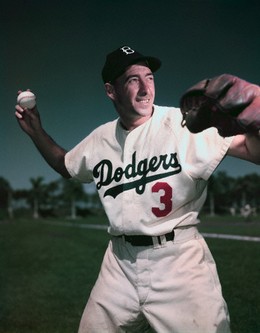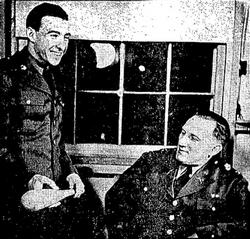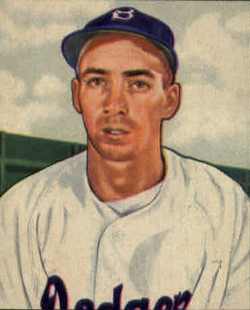

Billy Cox
Date and Place of Birth: August 29, 1919 Newport, Pennsylvania
Died: March 30, 1978 Harrisburg, Pennsylvania
Baseball Experience:
Major League
Position: Third Base
Rank: Private
Military Unit: 814th Signal Corps US Army
Area Served: Mediterranean and European Theater of Operations
Major League Stats: Billy Cox on Baseball-Almanac
“We have a couple of the hottest youngsters in baseball today in shortstop Billy Cox and outfielder Ralph Kiner.”
Frankie Frisch March 1946
He graduated from high school in 1939 and played
shortstop for the Newport semi-pro team. In 1940 he was signed by
nearby Harrisburg of the Interstate League and batted .288 with 24
doubles, five triples and eight home runs. He was also an all-star
shortstop. In 1941, Cox led the Interstate League in
batting, hits, doubles and total bases for Harrisburg. He had a
22-game hitting streak, hit .368 and set a league record for most
assists as a shortstop. Called up to Pittsburgh on September 4, 1941, the
young prospect was expected to replace Arky Vaughn in the Pirates’
infield. He played 10 games with the Pirates at the end of 1941,
hitting .270. On February 9, 1942, Cox entered military
service. He was initially stationed at New Cumberland Reception
Center with the 1301st Service Unit, where he had the
opportunity to play baseball. The New Cumberland team line-up
included Ralph Tisko (Buffalo pitcher), Stanley Shargey (Rome
Colonels), Louis Pugliano (Butler), and Bobby Rhawn (Columbus,
American Association). Cox is one of the few players allowed to play for
their major league team while in military service. It happened
during May 1942. “[The] appearance of Private Billy Cox in the
line-up for the Pittsburgh Pirates was the magnet for a crowd of
nearly 3,500 fans during their exhibition game with the Harrisburg
Senators of the Inter-State League, here last week,” wrote The
Sporting News on May 28, 1942. “By special permission of Army
officers, Cox was able to play with the Bucs for that night against
his former mates. Cox … made the most of the opportunity and
registered four runs in the Bucs’ 14 to 5 win.” Cox was soon overseas with the 814th
Signal Corps. He saw action in North Africa, Sicily, Italy, France
and Germany. His unit would come in behind the front line troops,
laying wires and setting up communication centers. There was little
time for baseball although he did make an appearance for an Army
all-star team against the Navy all-stars in Sicily in August 1944.
He also ran into few big league players although he did meet Zeke
Bonura. “I ran into Zeke in France,” he told The Sporting News
on May 2, 1946. “I just missed seeing our [Pirates] lefthander, Ken
Heintzelman, pitch in Mannheim, Germany. I got there the following
day.” Corporal Cox returned home in late 1945. He was
discharged from Indiantown Gap Separation Center on November 14,
1945, and immediately returned home, marrying his high school
sweetheart, Annie E Radle on November 26.
He signed a Pirates’ contract on February 1,
1946, and showed no early signs of the harrowing experience of war
as he immersed himself into a fine season both offensively and
defensively. In 121 games Cox batted .290 and struck out only 15
times in 411 at-bats. He batted .274 in 1947 but was traded to the
Dodgers at the end of the year. It was with the Dodgers that Billy Cox came into
his own. Cox moved over to third in Brooklyn and held down that
position for seven seasons and three National League Championships. Cox, 35, was traded to the American League’s
Baltimore Orioles at the end of 1954. He played 53 games for the
Orioles in 1955 and was batting a dismal .211 when he was traded to
the Cleveland Indians on June 15. Cox refused to report to
Cleveland. Instead, he went home and admitted himself to hospital
for a hernia operation shortly after.
Billy Cox, who had
been working as a steward in a private club in his rural hometown of
Newport, succumbed to
esophageal
cancer at Polyclinic Hospital on March 30, 1978. He was just 58. Created March 28, 2007. Updated April 12, 2007.
Copyright © 2015 Gary Bedingfield (Baseball
in Wartime). All Rights Reserved. 

Private
Billy Cox with Captain William R Lepper at New
Cumberland Reception Center
 Cox had
been away for four seasons and was now 26 years old. “I lost a good
part of my career,” he told The Sporting News on May 2, 1946,
“but I’m not kicking. I went through four years of the war, and came
out whole, so I guess I am lucky. However, I do want to make up for
lost time, and get in all the baseball I can in the next ten years.
I like the big league way of doing things, and that’s where I want
to stay.”
Cox had
been away for four seasons and was now 26 years old. “I lost a good
part of my career,” he told The Sporting News on May 2, 1946,
“but I’m not kicking. I went through four years of the war, and came
out whole, so I guess I am lucky. However, I do want to make up for
lost time, and get in all the baseball I can in the next ten years.
I like the big league way of doing things, and that’s where I want
to stay.”